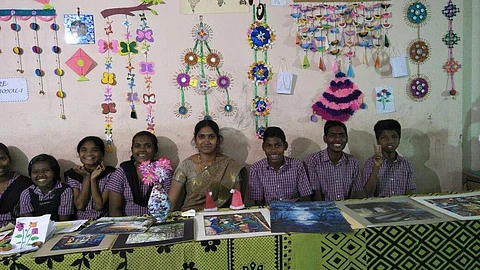

Sixteen years ago, a young Soly Ahirkar's thoughts of becoming a nurse quickly took a turn after she did a special education course that eventually led to her becoming a pioneer in rehabilitating and educating countless children in the dust-ridden villages of Kalameshwar. "When I first took up the course our college was the first to offer it. I had tried my hand at nursing but that didn't work out and I was financially limited from pursuing other options. A cousin mentioned this course and I was not doing anything then," says Soly, who is a pre-vocational trainer and one of the senior-most teachers at Prerana Special School.
She currently teaches children Pre-Vocation (I), which entails identifying children's skills according to the severity of their retardation and teaching them soft-skills like art, candle and card making, etc. that can later help them earn a living. "Many of these children cannot get normal jobs and most end up staying close to home or just remaining with the family after they finish school," she adds. The pre-vocation course is to both boost their confidence as well as send a message that these kids can have some semblance of normalcy.
Counselling parents is an intrinsic part of her job, and Soly recalls how three of them did the rounds of nearby villages identifying affected children and counselling their parents to let them go to a special school. It takes a lot of convincing, especially in areas where education is still a luxury, she says. "We have had parents who flat out refuse. They believe the child has no hope or future. Yet, there are others who have come to us and requested us to admit their children, after having refused us the first time around," she says. The major concern for parents was that the school would take advantage of their kids' disability.
Getting parents with female children to send them to school was another major area of concern. In a school with 70 kids, only 24 of them are girls. While the school has worked long, hard and successfully to eliminate stigma, there is still a long way to go, she adds. "It is much more difficult to get girls admitted to our school. Parents often tell us that they know we are going to return their girls to them eventually. They prefer that these girls do some chores in the kitchen or stay confined to the house all day long." A large part of the problem is the gender bias, with boys being sent to the special school with much more ease, "Once the family has a girl-child, the goal is to get her married. That's how it works in several rural places," she adds. Many of them are married to normal men from the village and return home after a year because they cannot cope.
"Today we have even the poorest families admitting their kids in our school. Girls are lesser than boys still but it is progress, one that did not seem likely when I first began," says Soly.
The journey has not been easy, and she recalls how people often termed the staff at Prerana as "mad" people. "They teased us and called us crazy for teaching kids who are known in rural areas as Madhimand bacche (mad kids)," she recalls. Did that deter them? "We knew what we had to do and that what we are doing is for the best. We have a job to do and it has resulted in a tremendous change, so let them talk," adds a determined Soly. And it is that determination that has powered her career through these years, "This is my life — to teach these kids and get them out of their homes is what I live for now," says Soly, the unshed tears reflecting in her slightly raspy voice.
Being a woman certainly helps, she adds, remembering how parents find it easier to entrust their kids with a woman onboard. "They often come to us, mothers especially, and their trust in us is tremendous. It helps, I guess as a woman because my maternal instincts count. Today, these kids are as much mine as they are their parents', and that is what my life is about," says a determined yet happy Soly.
